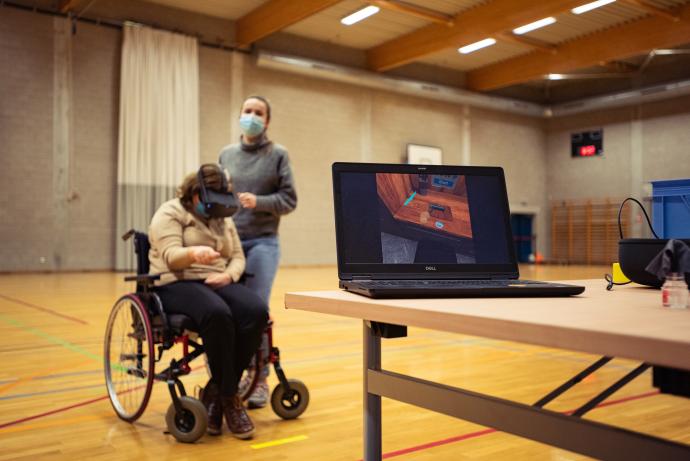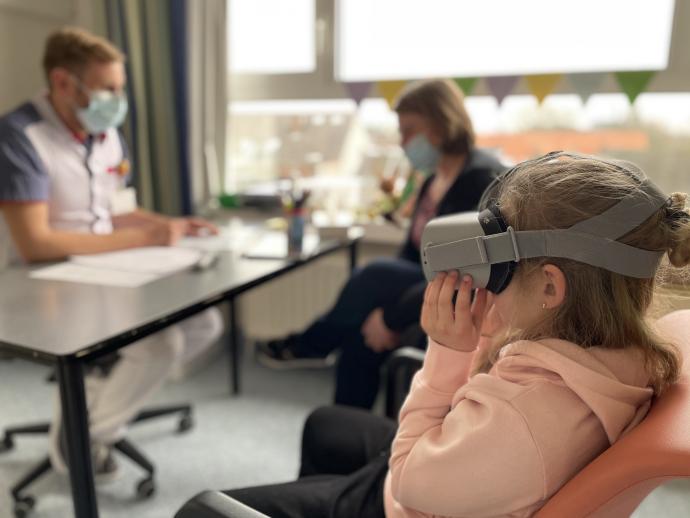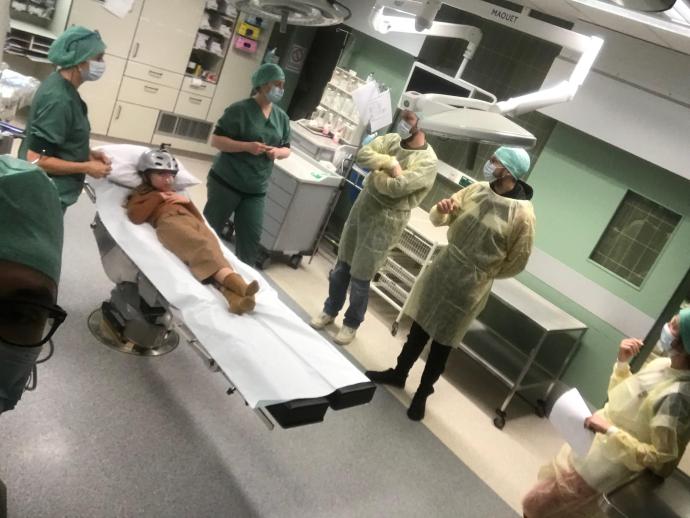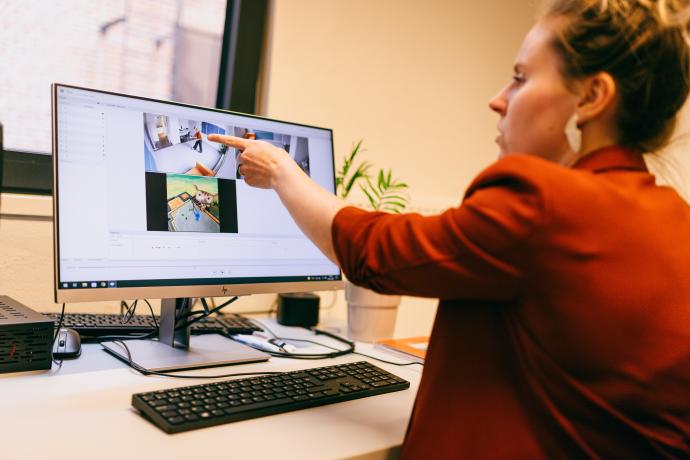The Immersive Care project was carried out by researchers from the Centre of Expertise Care and Well-being (research group Mobilab & Care and the research group People and Well-being) and the Centre of Expertise Sustainable Business and Digital Innovation with support from the Flemish Agency for Innovation and Entrepreneurship (Tetra program). During the project, 16 different care organizations and SMEs focused on immersive (care) technology worked closely together.
Immersive technology includes any form of technology that extends reality or creates a new reality, e.g. virtual reality (VR), augmented reality (AR), 360° video, mixed reality (MR) and immersive room or cave VR. These technologies provide a sense of immersion in an artificial environment that replaces or adapts the real environment, so that users become immersed in the newly created environment. During the project, we mainly worked with VR and 360° video using VR goggles (headsets).

Aim
Through this project, Thomas More sought to address three major needs within the Flemish healthcare context:
- Knowledge dissemination on immersive technology within the healthcare context to healthcare institutions (e.g., hospitals, residential aged care centers and rehabilitation centers), technology companies with a healthcare focus and companies developing immersive technology;
- Strengthen relations between these parties;
- Introduce hands-on immersive applications in the healthcare context.

Relevance
Immersive technologies (ImT) such as virtual reality (VR), augmented reality (AR), mixed reality (MR) and immersive room of cave VR have gained momentum in recent years. ImT work because virtual environments, like the real environment, can have a very strong impact on people's health and well-being. The use of ImT in healthcare is on the rise internationally, but its potential remains underused in Flanders. On the one hand, companies with technological know-how regarding ImT have insufficient insight into how care seekers experience ImT, what impact this has on their well-being, how this impact can be measured and to what extent ImT can be used as part of a treatment (e.g. reducing pain and anxiety). On the other hand, care institutions have insufficient knowledge about the possibilities of ImT for a better service, complementary to the existing care offer (e.g. projection of living room in hospital room can give caregiver the feeling of being cared for at home).

Our role
Research Group People and Well-being coordinated the project and contributed following expertise and knowledge:
- Implementation of digital applications for (mental) healthcare, in this case specifically virtual reality and 360° video
- Ethical procedures
- Setup and execution of user tests, from study design to reporting
As a partner within Thomas More, researchers from the Mobilab & Care research group contributed the following expertise and knowledge:
- Implementation of digital applications in a rehabilitation context
- Implementation of digital applications for persons with intellectual disabilities
- Setup and execution of user tests, from study design to reporting
As a partner within Thomas More, researchers from the Centre of Expertise Sustainable Business and Digital Innovation contributed the following expertise and knowledge:
- Marketing research
- Implementation of novel technologies for businesses, such as immersive technologies
In doing so, the researchers could count on input from a TETRA guidance group, which consisted of a mix of healthcare organizations and technology companies.
Accomplishments
During the Immersive Care project we reached out to different audiences, especially patients/clients and healthcare professionals in hospitals, rehabilitation centers, residential care centers and residential and support organizations for persons with intellectual disabilities, as well as developers and researchers.
To address the lack of knowledge about ImT in the field, an overview of available (inter)national ImT applications was prepared. Using 5 use cases and a specific training for staff, we provided new knowledge and hands-on experience to the different target groups. We specifically investigated the feasibility, acceptability and tolerability of VR or 360° video with both patients and care providers through questionnaires, observations, interviews and focus group discussions. The reports (and) poster presentations of these use cases can be found below at Downloads.
- VR in pediatrics: anxiety and pain management and relaxation
- 360° video in pediatrics: preparing for surgery
- VR for rehabilitation: virtual mirror therapy
- VR for individuals with intellectual disabilities: Learning to do shopping in VR
- VR for individuals with severe intellectual disabilities: staff training
- 360° video in residential aged care centers
Students from the Applied Psychology, Occupational Therapy and Nursing programs were involved through project work and undergraduate dissertations. Knowledge from the project also flows through to these programs. The knowledge and applications from this project continue to be disseminated during workshops and presentations for students, teaching staff and the clinical field, also after the project ended.

Researchers
Sylvie Bernaerts
Sylvie Bernaerts (PhD) is a researcher in the People and Well-being research group, research line Psychology and technology. Her areas of expertise are immersive technology in (mental) health care and ethics committee applications.
Wessel van de Veerdonk
Wessel van de Veerdonk (Msc) is research coordinator for Prevention and empowerment in the Human and Welfare Research Group. His research focus is currently on optimal preventive health care specifically for people with reduced access.
Jo Daems
Occupational therapist inspired by individuals with disabilities, dedicated to creating an inclusive society through research.
Downloads
Here you can find the most important results from the project in different reports and tools.

